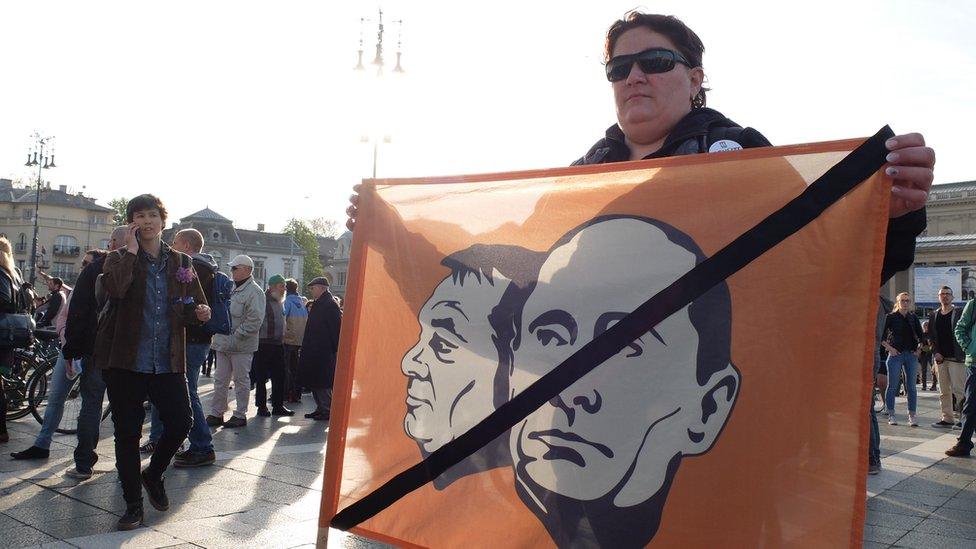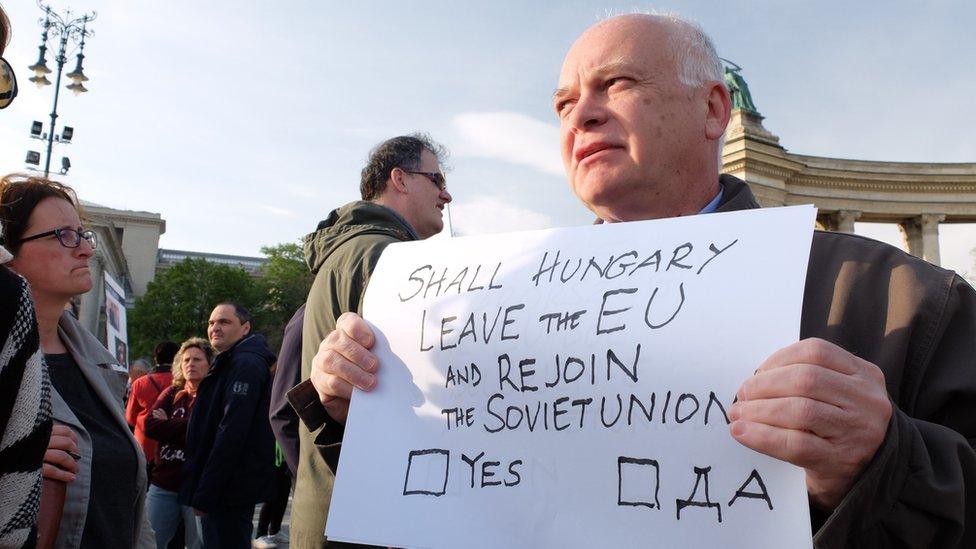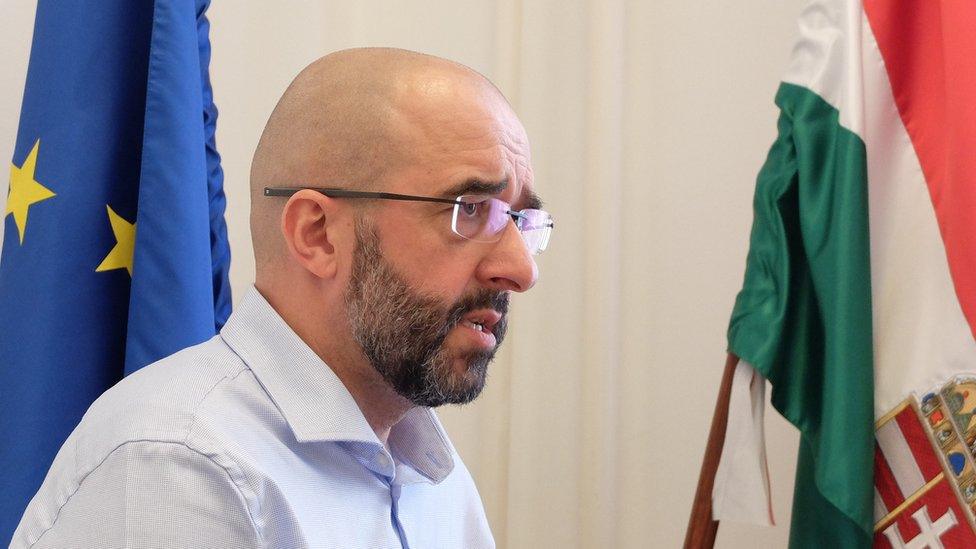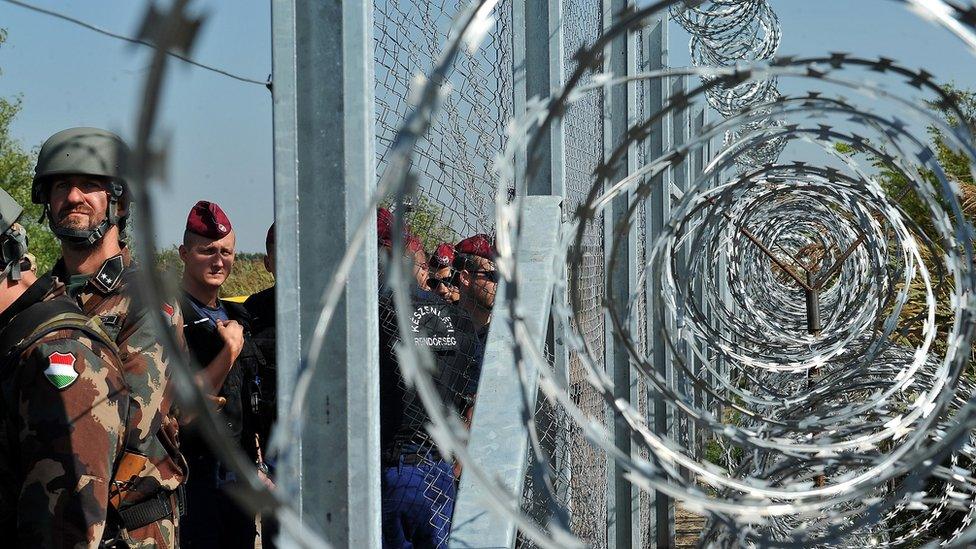Is Hungary copying Russia by targeting Soros-backed university?
- Published

The Hungarian capital Budapest has seen some of the biggest protests since Prime Minister Viktor Orban came to power in 2010.
They were sparked by a new law on higher education, which could see the closure of Central European University - a prestigious institution founded by the Hungarian-born American billionaire George Soros.
Protesters say the law is another step in Mr Orban's plan to transform his country into an "illiberal state" - a partial democracy, as opposed to the "open society" promoted by Mr Soros. The government says the protests are organised from abroad.
"What's happening here is very similar to what's going on in Russia," says protester Annamaria, a middle-aged teacher of disabled children, who went to Heroes' Square last week to protest against increasing Russian influence in Hungary.
"It brings back very unpleasant memories," she reflects with a sad smile, in the warm spring sunshine.

Many Hungarians are worried about the government's close ties with Vladimir Putin's Russia
The Budapest protests were initially triggered by the government's crackdown on Central European University (CEU).
Hungarians rally to save university
EU legal threat over Hungary crackdown
The Hungarian move follows Russia's closure of another Soros-backed institution, European University at St Petersburg, which had its licence revoked in March.
The demonstrations, which have drawn tens of thousands, have become a focal point for wider discontent and highlighted Hungary's increasing isolation in the EU.

An older generation of Hungarians remembers when the country was a Soviet satellite
Russian student Daria Dubovka is more closely affected by the events than most. A graduate of European University at St Petersburg, she arrived at CEU in September.
"As an academic, I know how important it is to find a community that thinks the same way as I do. To me, academia is that community, and I'm worried that the threat to my universities can harm not only my life, but it can also shrink and damage the whole academic network," she said.
Ekaterina Paustyan is studying for a PhD in political science. A graduate of Altai State University in Siberia, she says CEU has changed her life.
"I have an opportunity to take courses with excellent professors here and go to lectures by top scholars such as Francis Fukuyama, Joseph Stiglitz and Sergei Guriev."

CEU students come to Budapest from all over the world
The Hungarian government believes CEU has violated Hungarian rules, an accusation the university rejects.

Is the new law 'punitive'?
The new law requires universities offering degrees with non-European accreditation, such as CEU, to open campuses outside Hungary. CEU President Michael Ignatieff said such legislation was "punitive and discriminatory".
CEU does not have a US campus. It offers US- and Hungarian-accredited postgraduate degrees, and has 1,440 students - 335 from Hungary and the rest from 107 other countries.
The new law also requires such institutions to sign up to international treaties to govern their operations.
CEU says the changes mean it faces having to close to new enrolments in February 2018.
The government believes that CEU is part of a campaign orchestrated by George Soros to destroy the traditional values of Hungarian society and undermine national sovereignty.
Prime Minister Orban views Mr Soros as an ideological enemy.
Government spokesman Zoltan Kovacs believes Mr Soros's "open society" is a utopia. "His NGOs [non-governmental organisations] behave like governments... they think they have the right to say what's best for the country. But they have no political mandate."

The government has now proposed a new law tightening rules on NGOs. It will require them to register with the authorities if they receive an annual foreign income of at least 7.2m forint (£19,240; $24,700).
In those cases, NGOs will also have to put the label "foreign-funded organisation" on their publications.
The rules are once again targeting organisations funded by Mr Soros, who for decades has given away billions of dollars to promote a liberal, "open society" culture.

Hungary has a problem with George Soros, the government spokesman said
Critics say it is another striking parallel with Russia, where a 2015 law on "undesirable organisations" led to a ban on Soros foundations. Russian NGOs have to call themselves "foreign agents" if they get any foreign funding.
The Budapest branch of anti-corruption watchdog Transparency International (TI) is one of the NGOs targeted by the new law. Yet the money it gets from Mr Soros' Open Society Foundation accounts for only 7% of its budget, says Jozsef Peter Martin, head of TI's Budapest office.
He says 54% of the organisation's funding comes from the European Commission. Under the new law, this will have to be registered as "an unknown source". So does an EU member state - Hungary - consider EU support for an NGO as suspicious?
"It's a populist government and it's one of the distinctive traits of populists that they always need enemies. For a long time, the EU was such an enemy, which is absurd, because 6% of Hungarian GDP last year came from the EU," Mr Martin said.

PM Viktor Orban has taken a hard line on migrants - his most public dispute with Brussels
Analysts say the protests have taken the Orban government by surprise.
"Most people didn't expect the CEU to become a spark," said Robert Laszlo from a public policy think-tank, Political Capital Institute. "But somehow it turned out to be very relevant to a lot of young people."